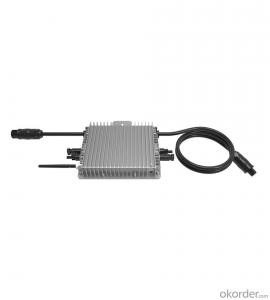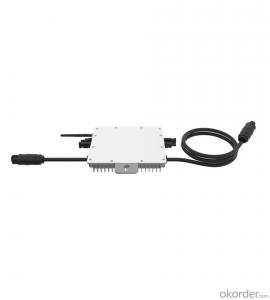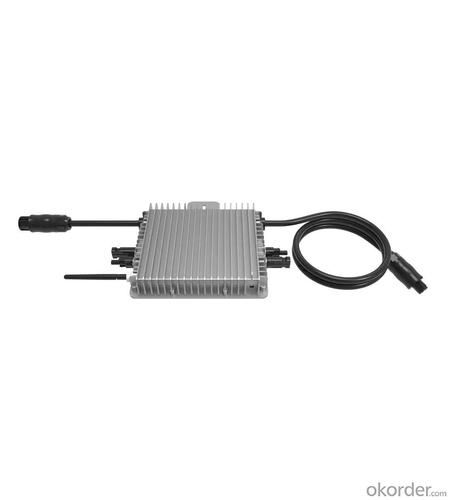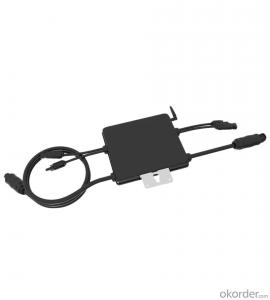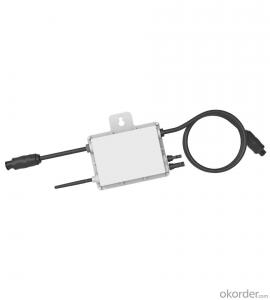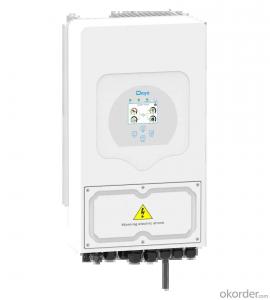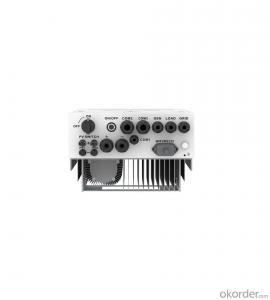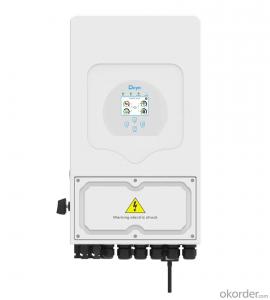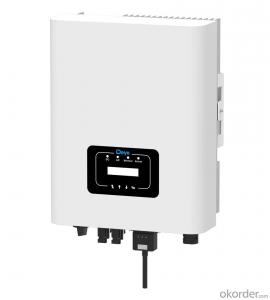2000 Watt Solar Inverter Sun600/800/1000G3-EU-230 600-1000W Single Phase 2 MPPT Micro-Inverter Rapid Shutdown
- Loading Port:
- Ningbo
- Payment Terms:
- TT OR LC
- Min Order Qty:
- 100 pc
- Supply Capability:
- 5000 pc/month
OKorder Service Pledge
OKorder Financial Service
You Might Also Like
Specification
The SUN 600/800/1000G3 is a new generation grid-tied microinverter with intelligent networking and monitoring systems to ensure maximum efficiency. The SUN 600/800/1000G3 is optimized to accommodate today’s high output PV modules effectively with up to 500W output and dual MPPT. Also, it supports rapid shutdown application, ensuing your investment safe.
Module level monitoring, safer and smarter
Max. DC input current 12.5A, adapt to 500W PV module
Rapid shutdown function
IP67 protection degree,10 years warranty
PLC, Zigbee or WIFI communication
2 MPP trackers, module level monitoring
| Technical Data | ||||||||
| Model | SUN600G3-US-220 | SUN800G3-US-220 | SUN1000G3-US-220 | |||||
| Input Data (DC) | ||||||||
| Recommended input Power (STC) | 210~400W (2 Pieces) | 210~600W (2 Pieces) | 210~600W (2 Pieces) | |||||
| Maximum input DC Voltage | 60V | |||||||
| MPPT Voltage Range | 25~55V | |||||||
| Full Load DC Voltage Range (V) | 24.5~55V | 33~55V | 40~55V | |||||
| Max. DC Short Circuit Current | 2×19.5A | |||||||
| Max. input Current | 2×13A | |||||||
| No.of MPP Trackers | 2 | |||||||
| No.of Strings per MPP Tracker | 1 | |||||||
| Output Data (AC) | ||||||||
| Rated output Power | 600W | 800W | 1000W | |||||
| Rated output Current | 2.7A | 2.6A | 3.6A | 3.5A | 4.5A | 4.4A | ||
| Nominal Voltage / Range (this may vary with grid standards) | 220V/ 0.85Un-1.1Un | 230V/ 0.85Un-1.1Un | 220V/ 0.85Un-1.1Un | 230V/ 0.85Un-1.1Un | 220V/ 0.85Un-1.1Un | 230V/ 0.85Un-1.1Un | ||
| Nominal Frequency / Range | 50 / 60Hz | |||||||
| Extended Frequency / Range | 45~55Hz / 55~65Hz | |||||||
| Power Factor | >0.99 | |||||||
| Maximum units per branch | 8 | 6 | 5 | |||||
| Efficiency | ||||||||
| CEC Weighted Efficiency | 95% | |||||||
| Peak Inverter Efficiency | 96.5% | |||||||
| Static MPPT Efficiency | 99% | |||||||
| Night Time Power Consumption | 50mW | |||||||
| Mechanical Data | ||||||||
| Ambient Temperature Range | -40~65℃ | |||||||
| Size (mm) | 212W×230H×40D (Without mounting bracket and cable) | |||||||
| Weight (kg) | 3.15 | |||||||
| Cooling | Natural cooling | |||||||
| Enclosure Environmental Rating | IP67 | |||||||
| Features | ||||||||
| Compatibility | Compatible with 60~72 cell PV modules | |||||||
| Communication | Power line / WIFI / Zigbee | |||||||
| Grid Connection Standard | EN50549-1, VDE0126-1-1, VDE 4105, ABNT NBR 16149, ABNT NBR 16150, ABNT NBR 62116, RD1699, UNE 206006 IN, UNE 206007-1 IN, IEEE1547 | |||||||
| Safety EMC / Standard | UL 1741, IEC62109-1/-2, IEC61000-6-1, IEC61000-6-3, | |||||||
| Warranty | 10 years | |||||||
- Q: How does a solar inverter handle power surges or fluctuations?
- A solar inverter handles power surges or fluctuations by regulating the flow of electricity. It monitors the incoming power and adjusts the voltage and frequency to match the requirements of the connected devices. In case of power surges, the inverter has built-in protection mechanisms such as surge suppressors or voltage regulators to prevent any damage to the system. Additionally, some inverters feature advanced technologies like Maximum Power Point Tracking (MPPT) that optimize the solar panel's performance and enable better handling of fluctuations in power output.
- Q: Can a solar inverter be used in a ground-mounted solar tracking system?
- Yes, a solar inverter can be used in a ground-mounted solar tracking system. The solar inverter is responsible for converting the direct current (DC) generated by the solar panels into alternating current (AC) that can be used to power electrical devices or be fed back into the grid. Whether the solar panels are fixed or mounted on a tracking system, the inverter's function remains the same.
- Q: How do you calculate the maximum power point current for a solar inverter?
- The maximum power point current for a solar inverter can be calculated by using the maximum power point tracking (MPPT) algorithm. This algorithm constantly adjusts the operating conditions of the inverter to maximize the power output from the solar panels. It does this by varying the input voltage and current to find the point at which the power output is at its highest. This maximum power point current can be determined using mathematical calculations and algorithms employed by the solar inverter.
- Q: How does a solar inverter convert DC power into AC power?
- A solar inverter converts DC power into AC power through a two-step process: first, it converts the DC power generated by solar panels into a high-frequency AC current, and then it uses a transformer to adjust the voltage of the AC current to match the desired grid voltage.
- Q: What are the potential risks of overheating a solar inverter?
- The potential risks of overheating a solar inverter include reduced efficiency and decreased lifespan of the inverter, potential damage to internal components, increased risk of electrical fires, and potential disruptions to the solar power system's operation.
- Q: Can a solar inverter be used in a building-integrated photovoltaic system?
- Yes, a solar inverter can be used in a building-integrated photovoltaic system. A solar inverter is an essential component in any photovoltaic system as it converts the direct current (DC) produced by the solar panels into alternating current (AC) that can be used to power electrical devices in a building. In a building-integrated photovoltaic system, the solar panels are integrated into the building's structure, such as being incorporated into the roof or facade. The solar inverter is still required to convert the DC electricity generated by the integrated solar panels into AC electricity that can be used in the building.
- Q: Can a solar inverter be used in systems with multiple solar arrays?
- Yes, a solar inverter can be used in systems with multiple solar arrays. In fact, it is common practice to connect multiple solar arrays to a single inverter, especially in larger solar installations. The inverter converts the DC power generated by the solar arrays into AC power that can be used by the electrical grid or consumed directly. By connecting multiple arrays to a single inverter, the overall system efficiency can be maximized, and it allows for easier monitoring and control of the entire solar power system.
- Q: Is it possible to upgrade my existing solar inverter without replacing the entire system?
- Yes, it is possible to upgrade an existing solar inverter without replacing the entire system. In many cases, solar inverters can be upgraded by simply replacing the existing inverter with a newer model that offers more advanced features or higher capacity. However, it is important to consult with a professional solar installer to determine the compatibility of the new inverter with your current system and ensure a successful upgrade.
- Q: How does a solar inverter handle frequency fluctuations in the grid?
- A solar inverter handles frequency fluctuations in the grid by continuously monitoring the frequency of the grid and adjusting its own output accordingly. If the grid frequency increases, the inverter reduces its output to maintain stability. Conversely, if the grid frequency decreases, the inverter increases its output to help stabilize the grid. This way, the solar inverter actively contributes to maintaining a stable frequency in the grid.
- Q: Can a solar inverter be used with a solar-powered water purification system?
- Yes, a solar inverter can be used with a solar-powered water purification system. A solar inverter is responsible for converting the direct current (DC) electricity produced by solar panels into alternating current (AC) electricity that can be used to power various appliances and systems. In the case of a solar-powered water purification system, the solar inverter would be essential in converting the DC electricity generated by the solar panels into the appropriate AC power required to operate the system's pumps, filters, and other components.
Send your message to us
2000 Watt Solar Inverter Sun600/800/1000G3-EU-230 600-1000W Single Phase 2 MPPT Micro-Inverter Rapid Shutdown
- Loading Port:
- Ningbo
- Payment Terms:
- TT OR LC
- Min Order Qty:
- 100 pc
- Supply Capability:
- 5000 pc/month
OKorder Service Pledge
OKorder Financial Service
Similar products
Hot products
Hot Searches
Related keywords
